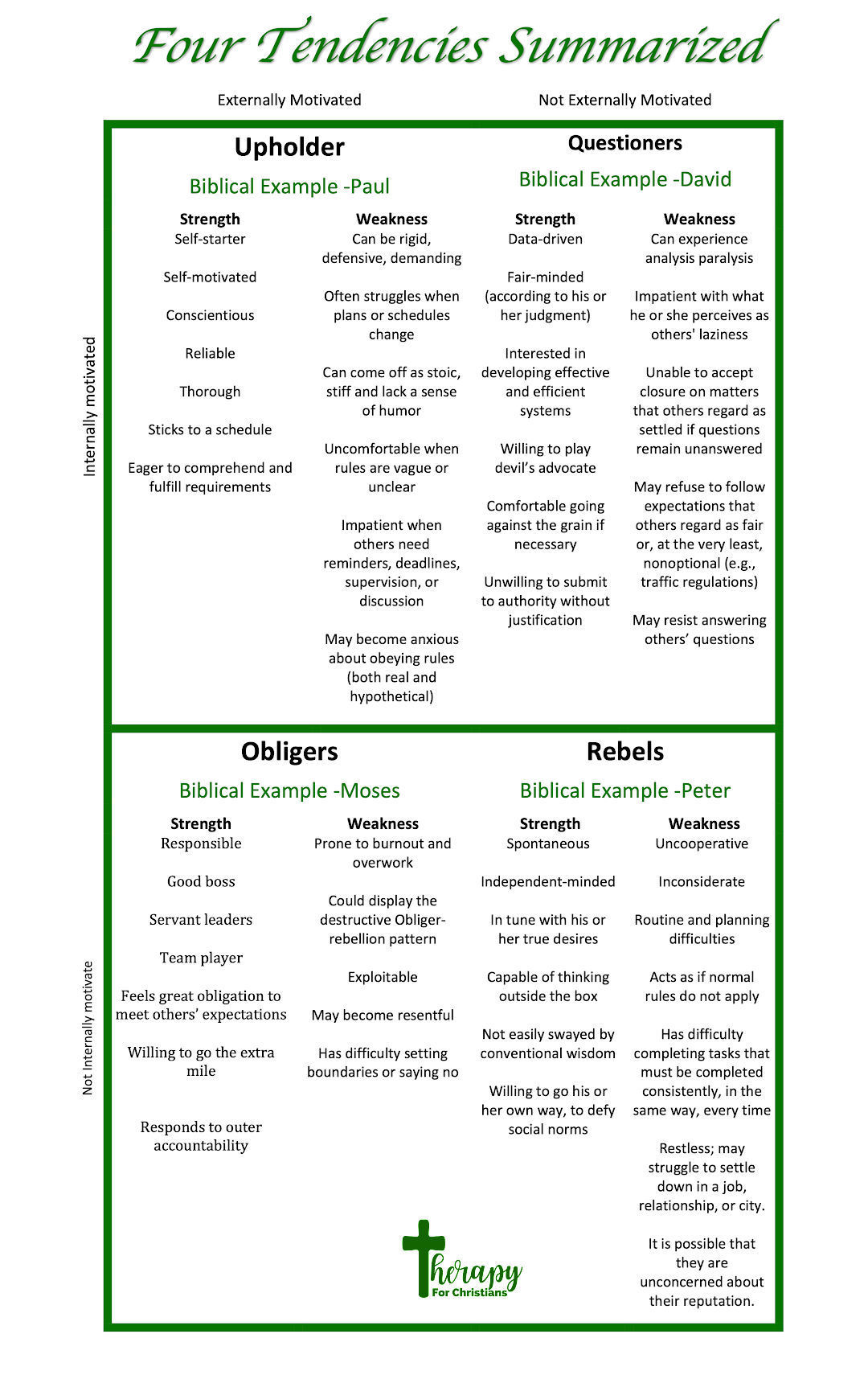
Do you ever wish you could understand yourself and others better? Well, you are not alone, we all do. This life is not easy and there will be hundreds of moments that we need a little motivation to keep it moving.
However, motivation is not as simple as most people make it out to be. What motivates me, may not motivate you, and what motivates you, may not motivate your spouse or child. This is because God made us all so different, yet also so alike. Understanding what motivates us and the people around us is not an easy task, but it's also not impossible.
One way to understand ourselves and each other is to learn about the four tendencies framework of motivation. The Four Tendencies is a book written by Gretchen Rubin that will change the way you see motivation. Knowing your tendency, as well as the tendencies of those closest to you will also make you so much more self-aware and understanding towards others.
Once you understand the four tendencies , you'll no longer get mad at people for not being as motivated as you in certain situations. Plus, you'll be more aware of why you are not as motivated in some situations, as you are in others. So what exactly are the four tendencies?
What are the Types of Tendency that Shape Motivation
Gretchen Rubin discovered that by asking the seemingly dry question "How do I respond to expectations (both inner expectations, like a goal they've set for themself, and to outer expectations, like a client waiting on them)?" we gain explosive self-knowledge and knowledge of others. Based on how people answer this one question, she began to fit people into the Four Tendencies:
Upholders easily meet both outer and inner expectations. "My freedom is my discipline."
Questioners meet inner expectations, but only if the outer expectations make sense. "I'll comply if you can convince me why."
Obligers (the most common Tendency) meet outer expectations but struggle to meet inner expectations; thus, they require outer accountability to meet inner expectations. "You can rely on me, and I rely on you to rely on me."
Rebels (the smallest group) are exactly that, they value freedom and choice and do what they want to do when they want to do it. They defy all expectations, both external and internal. They do what they want, when they want, and they don't usually tell themselves what to do. "You can't make me, and I can't make you."
Each tendency is linked to a specific strategy for dealing with the two types of expectations we face, which is perfectly summarized in Gretchen's graphic below. Knowing which category you fall into will help you get yourself to do things much more often. And knowing which category the people around you fall into will help you influence them to do things or understand why they don't.
According to studies, 41% of the world are Obligers, 24% are Questioners, 19% are Upholders, and 17% are Rebels. Already know which one you are? If not, you can take this quiz to find out.
 Like on Facebook
Like on Facebook
How to Identify Your Tendency
So in order to identify your tendency and the tendency of those around you just answer this question "How do I (or they) respond to expectations?".
Now that you know your tendency and probably have an idea of the tendencies of those closest to you, let's dive deeper. In the rest of this post, we'll be exploring the strengths and weaknesses of each tendency, while also looking at Biblical examples and learning how to work with ourselves and others in each tendency.
Upholders
Upholders can easily meet both inner and outer expectations. They are extremely disciplined and thrive on schedules and routines.
Strengths of the Upholders
Most disciplined of all the tendencies.
Gets more energy from meeting both inner and outer expectations.
Great at forming habits and systems
Self-starter
Self-motivated Conscientious
Eager to understand and meet expectations
Weaknesses of the Upholders
Other people may assume they're mean or cold
They follow rules even when it is way better not to (for example following the rules of the company even when it goes against their Christian values)
Bible Example of an Upholder
Paul is a perfect example of an upholder four tendencies type. When he was a Pharisee he was an extreme rule follower. By extreme, I mean he was trying to kill the people that he thought weren't following the rules. Fortunately, when Christ met him on that road to Damascus, everything changed.
Yes, he was still disciplined and did a lot of work for the kingdom but he didn't let his weaknesses get the better of him. Instead of being passionate about rules, he became more passionate about spreading the good news of grace.
How to Work with Yourself as an Upholder
If you're an Upholder, you're probably pretty happy with the way you work and get things done. Still, there are going to be moments where you need a push in the right direction. Here's how you can work with yourself as an upholder:
If you find yourself fulfilling outer expectations while neglecting inner expectations. Clarify your inner expectations and create a to-do list for them.
If you find yourself working too much because there's so much on your to-do list. Make smaller to-do lists or keep multiple different ones.
How to Work with an Upholder
Upholders are perfect for work environments, they are extremely disciplined and know how to get things done. However, they often get frustrated with Rebels and Obligers for not following through on absolutely everything they say they will. The thing is, Upholders often forget that only 19% of the population is like them, so what motivates others will be different from what motivates them. Here's how to work with an upholder:
If you want them to do something. Just ask. If they can they will, if they can't they'll tell you. You can rely on them to do what they say they will.
If you want to be spontaneous or change plans at the last minute and the upholder says no, it's easy to get upset. They may come off as cold but remember, they're planners. Give them early notice or a good enough reason to change the plan and they will.
If you find an upholder upset after they have made a simple mistake. Don't brush it off. Mistakes are a big deal for upholders, so encourage them instead.
Questioners
Questioners are best at meeting inner expectations. However, they can turn all outer expectations into inner expectations if they believe it is reasonable to do so.
Strengths of the Questioners
Extremely logical and efficient
Researches enough to do things right the first time
Always tries to improve processes
Weaknesses of the Questioners
Tends to be overconfident in their beliefs
Other people may see them as annoying or rude if they ask too many questions
Can get into analysis paralysis and take forever to get started on something new
Bible Example of a Questioners
If you are looking for a biblical example of the questioner personality four tendencies type, consider David. He questioned his brothers and the Isrealites for their lack of faith before defeating Goliath. After that, he questioned why the Ark of God was in a tent when he lived in a house. Plus, there's no doubt he was logical and efficient. He tended to sheep and then a whole nation with utmost efficiency.
How to Work with Yourself as a Questioner
Questioners, just like Upholders are generally pretty happy with themselves. However, it is very easy for them to get frustrated at others for doing things that do not seem logical or efficient.
If you find yourself constantly frustrated with other people because they are not seeing things as logically as you are. Remember that only 24% of the population is like you.
If you can't bring yourself to do something because you don't see the logic behind it but everyone else says it's important. Allow yourself to do it just for them, let them be your reason.
If you find yourself stuck in analysis paralysis but want to get started on something. Give yourself a deadline.
If people are starting to get mad at you for asking too many questions. Ask them in a better way. People will get defensive if you question everything they say. Frame your questions in a way that benefits them or makes them feel like you're genuinely just curious.
How to Work with a Questioner
Questioners are very efficient and generally meet deadlines. This makes them great people to work with. You can always trust them to follow through on what they say.
Ironically, questioners but hate being questioned. They feel that they are always right based on the amount of research they do. Here's how to work with a questioner:
If you want them to do something. Answer all the why's they could possibly ask. Why this task. Why now. Why in this way. Why by this date, etc.
If their constant questioning is starting to get to you. Remember not to take it personally. Questioners ask questions to everyone, not just you.
If they ignore your questions. Ask them how they got to the conclusion you're curious about, they love sharing their knowledge.
If they trust their opinion over an expert just because they did their research. Don't tell them that they're crazy. Encourage them to just try the experts' opinion, the love experimenting so this might convince them.
Obligers
Unlike the previous two tendencies, obligers need outer accountability to meet their inner expectations. They can easily meet outer expectations but they often neglect their inner expectations.
For this reason, obligers can gain the most from learning about their tendency.
Strengths
Easiest to get along with
Reliable
Meet deadlines set by other people with ease
Weaknesses
Struggles to meet personal goals
Feels obligated to others even when they aren't
Struggles with self-care. Cannot say no even when they are overwhelmed.
Bible Example of an Obliger
Moses is a good example of an Obliger. He seemed to be weak in some stages of his life, he even told God what his weaknesses are and why he doesn't think he’s good enough. But when he had a clear outside expectation from God or from the Isrealites he did things even he never thought was possible, the outer expectations drove him to overcome his weaknesses.
How to Work with Yourself as an Obliger
As I mentioned before, Obligers need outer accountability to meet an inner goal. This makes some of them feel weaker but they aren't actually weak, they're just wired differently.
Fortunately, God never leaves anyone in a deficit, He ensures all His people have everything they need to do what He called them to do no matter their tendencies. So there are always ways to create accountability. Here's how to work with yourself as an obliger:
If you find yourself upset that you can't meet the goals you set for yourself. Find ways to create accountability.
If you find it hard to say no to someone even when you have a lot on your plate. Remember saying no to some things opens up space for better things.
If you feel like people are taking advantage of you. Talk to them, they might not even realize they're doing it.
If you assume getting rid of all the outer expectations will make room for you to pursue your inner ones. Remember that it's not, you actually need accountability to fulfill your inner expectations. With or without those deadlines on your plate, you'd still struggle to meet inner expectations with no accountability.
So what are some ways to get accountability?
Well, even though everyone in the category is an obliger, they're still very different from each other. What makes some of them feel accountable won't necessarily make others feel accountable. For example, some obligers feel accountable to complete everything on their calendar, while others only feel accountable to other people.
I've listed some ideas for creating accountability that you can try, if one doesn't work, try another. If none of these work, try to come up with your own ideas as well, you can be very creative when it comes to making an inner goal an outer expectation. Here are the most popular:
Tell all your goals to someone you care about. Then give them the deadlines you want to give yourself and ask them to check on you by that date.
There are many websites and apps that provide a platform for accountability. A quick Google search will help you find some of those.
Get a paid coach. Investing in a coach will keep you accountable.
Realize that people are watching you and everything you do has an influence on the people around you. Do it for them. Think of yourself as a role model.
Imagine yourself 5 or 10 years from now. Then ask yourself what the "you" then, would want the "you" now to do.
If you need to invest in something but you're worried about not following through and wasting your money. Use someone else's money. That will make you feel more accountable.
Get an online or in-person accountability partner, preferably with the same goal you have so you can keep each other accountable.
If you're in ministry or putting off something you know God called you to do, remember this is not for you. If God called you to do it, it's for Him. You're accountable to Him.
Obliger Rebellion
Another thing you may have noticed as an Obliger is that you are often taken advantage of. This leads to resentment so it is extremely important to realize what's happening as early as possible. If you face outer expectations that are not fair or realistic for too long, you might start to feel like you are taken for granted. When this happens, you can fall into Obliger Rebellion.
Obliger Rebellion will cause you to stop meeting all expectations. You might find yourself doing dramatic things like ending a marriage or quitting a job on impulse. After a while, even if nothing changes, that feeling will end and you will go back to normal, but those burnt bridges are still going to be burnt. Obviously, nobody wants this, so the best thing to do is prevent Obliger Rebellion from ever happening.
The problem with this is that to prevent it, you'll have to stand up for yourself, which is against your nature. You'd naturally hope that someone else notices and stands up for you or the person realizes what they're doing but that rarely happens. All the other tendencies stand up for themselves, so they expect you to do the same. I know that it's hard but you don't have to create conflict to stand up for yourself, just bring it up in a conversation. Most people don't even realize when they're taking advantage of other people.
How to Work with an Obliger
Obligers are great people to work with. They bring teams together and strive to sustain peaceful relationships. They are also incredibly reliable. However, Obligers often get taken advantage of, so if you work with one try to ensure they are treated fairly. Here's how to work with an Obliger:
If you want them to do something. Ask, obligers are always willing to help, just don't take advantage of them.
If you find yourself upset because an obliger that you care about is not taking care of themself. Don't judge or nag them, instead help them find accountability.
If someone is always asking you when you need something by, don't get annoyed. They're asking for accountability because they know they need it.
Another important thing to mention is that some Obligers start to ignore expectations from those closest to them, like their spouse for example. This might seem odd because, in theory, it's an outer expectation. However, when the Obliger feels really close to someone, that person’s expectations become like inner expectations. So they end up ignoring what that person wants exactly like they ignore what they themselves want. If you've noticed your spouse doing this, tell them, just knowing might help. But if it doesn't, seek accountability.
Rebels
Rebels are exactly that. They do what they want, when they want, and in the way you want. If another person asks them to do the very same thing that they already wanted to do, they will resist. They place a lot of value on freedom, choice, and self-expression.
Strengths
Known as the most authentic people. They don't try to hide what they think, do or believe in.
Can meet challenges as long as they don't have to follow anyone's instructions when doing so.
Can accomplish great things even if just to prove others wrong.
Weaknesses
May alienate people they care about just because they tend to resist expectations.
May struggle in a work or team environment because they don't respond well to authority.
Biblical example of a Rebel
Peter is the perfect example of a Rebel in the Bible. He struggled with outer expectations because he wanted things done his way. His denial of knowing Jesus during the crucifixion despite his love for Him shows how he struggled to meet inner expectations as well. Just like Peter, you may be a rebel, but that does not make you a bad person.
How to Work with Yourself as a Rebel
As a rebel, you can do anything you want to do, so it's extremely important to understand yourself. You need to be clear on your values, and allow that to be the criteria that help you decide whether or not you want to do something. So here's how to work with yourself as a Rebel:
If you find yourself feeling less motivated to do something just because you or someone else wants you to do it. Look at your values again, if it aligns, think of it as an opportunity to express your authentic self.
If you want to do something for someone you love but it's also annoying you that they expect it of you. Think about it in the way you originally did. You are doing it out of love, not an obligation.
If you find yourself not wanting to do something you were originally excited to do just because someone else asked. Remind yourself that you are allowed to follow through with your plans, and the fact that someone else wants it now as well doesn't change anything.
If you feel unproductive and do not even want to look at your to-do list. Gamify it. Find ways to challenge yourself into doing everything on your list.
How to Work with a Rebel
Working with a rebel can be quite difficult. It may sometimes seem like they're inconsiderate, but they're not, they're just different. Here's how to work with rebels:
If you want them to do something. Use the information-consequence-choice sequence (more on that below).
If you're upset that they keep changing plans or not making them. Don't take it personally, they're like that with everyone.
If you can see the rebel not taking care of themselves and it's starting to upset you. Don't judge them, challenge them instead (more on that below as well.)
If you complimented them on their work and now they seem less motivated, they probably feel like it's an expectation. Try to frame compliments in a way that seems like affirmation, not expectation.
Communicating with Rebels
Communicating with this group of people is different from the rest. The best way to get them to do something is by using the Information-Consequence-Choice sequence. The sequence works with all tendencies but it's especially important for Rebels.
In her book, Gretchin gives a great example of what a school counselor might say to a Rebel student who does not want to do her volunteer hours:
“To graduate high school, students must complete 100 volunteer hours. Students who start earlier as a freshman or sophomore have more choices about projects and when to do them (information). The longer students wait, the fewer choices they have. I know seniors who lost their spring break because they had to spend that time doing their service hours (consequence). My door is open whenever you’d like to talk about choosing a service project (choice).”
After you give them the Information-Consequence-Choice message don't check on them or bother them. They work best without supervision.
Also, if a Rebel does not want to do something they know they should do, do not protect them from the consequences. They need to experience those unpleasant consequences for themselves in order to learn the importance of something.
You can also motivate a rebel by challenging their identity. For example, instead of asking them to stop missing their deadlines, say “Why do you keep missing your deadlines? It seems like you don't care about your work!” If this person does care about their work, they will most likely turn things in on time from then on.
One more amazing way to motivate a rebel is to challenge their ability. For example, you can say, “Well, it’s hard for most people to stay productive these days, so I totally get why you’re struggling too.” This kind of statement will light a fire within them to prove that they are capable of overcoming that challenge and do what others cannot.
This brings us to the end of the four tendencies. I hope this has helped you understand not only yourself better but also the people around you. Just knowing what motivates you and them can change everything in your life and relationships. And that was my goal with this post.
Always remember that no matter what the weaknesses of your tendency are, God has already made a way for you to overcome them. He would never call you to do something He hasn't equipped you for. That's why it's important to be self-aware and use the tools He provides through other people.
If you want to know more about the four tendencies, you can buy Gretchin Rubin's book by clicking here.
Final Thoughts Regarding the Four Tendencies Framework of Motivation
Since our Tendency shape every aspect of our behavior, understanding this framework allows us to make better decisions, meet deadlines, experience less stress and burnout, and interact with others more effectively. Equally important, we can use the Four Tendencies to deal with others more effectively.
However, while it is easy to get carried away with personality types like these, it can also be dangerous. When you chisel your tendency or the tendency of others into stone, it can be easy to turn it into an excuse and stop believing you or others can change. This belief is anti-Christian.
Understanding your motivation and the motivation of others can be a long process. It is often helpful to engage in a therapeutic process along the way. If you are looking for a Christian mental health provider in your care, check out our therapists and life coach directory here.
You can take a deep dive into Gretchen Rubin's Four Tendencies Framework by ordering a copy of the Four Tendencies via amazon or where ever books are sold.
Other Books by Gretchen Rubin, the author of The Four Tendencies:
Outer Order Inner Calm: declutter and organize to make more room for happiness The Happiness Project Mini Posters: A Coloring Book: 20 Hand-Lettered Quotes to Pull Out and Frame
The Happiness Project Mini Posters: A Coloring Book: 20 Hand-Lettered Quotes to Pull Out and Frame Happier at Home: Kiss More, Jump More, Abandon Self-Control, and My Other Experiments in Everyday Life
Happier at Home: Kiss More, Jump More, Abandon Self-Control, and My Other Experiments in Everyday Life Better Than Before: What I Learned About Making and Breaking Habits--to Sleep More, Quit Sugar, Procrastinate Less, and Generally Build a Happier Life
Better Than Before: What I Learned About Making and Breaking Habits--to Sleep More, Quit Sugar, Procrastinate Less, and Generally Build a Happier Life The Happiness Project, Tenth Anniversary Edition: Or, Why I Spent a Year Trying to Sing in the Morning, Clean My Closets, Fight Right, Read Aristotle, and Generally Have More Fun
The Happiness Project, Tenth Anniversary Edition: Or, Why I Spent a Year Trying to Sing in the Morning, Clean My Closets, Fight Right, Read Aristotle, and Generally Have More Fun
About the Author:

Corine Williams, Ph.D. is Clinical Psychologist that is currently seeing clients in the States of Maryland, New Jersey, and New York. You can find out more about her practice by visiting www.therapyforchristians.com/corinewilliams. In addition to providing individual therapy, Dr. Williams is also passionate about writing books and designing merchandise that educate, uplift, and normalize mental health subject in the Christian community. You can find out more about her at www.booksbycorine.com or by visiting her amazon profile here: https://www.amazon.com/Corine-Hyman/e/B00AWZ5FL2
Help us increase mental health awareness in the Christian community by donating through our paypal link here: www.paypal.com/therapyforchristians, joining our mailing list by clicking below, or join our provider list here: Provider listing
Disclaimer: the information, including but not limited to, text, graphics, images, and other material contained on this article are for informational purposes only. No material on this site is intended to be a substitute for professional medical advice, diagnosis, or treatment. If you are looking for a Christian counselor near you, please check out our directory located here: Christians Therapist Near Me
.png)
















